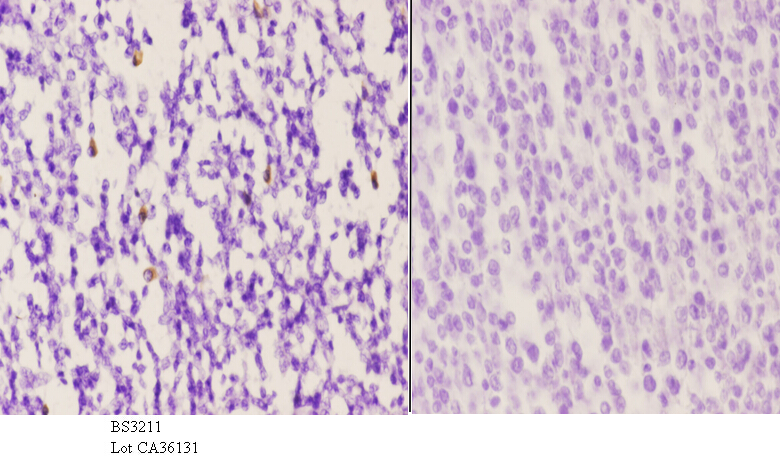Product Name :
VPAC1 (V371) polyclonal antibody Background :
The vasoactive intestinal peptide (VIP) and the pituitary adenylate cylaseactivating polypeptide (PACAP) belong to a superfamily of peptide hormones that include glucagon, secretin and growth hormone releasing hormone. The effects of VIP and PACAP are mediated by three G-protein coupled receptors, VPAC1, VPAC2 and the PACAP receptor (also designated PAC1-R). The VPAC receptors have equal affinities for VIP and PACAP, which stimulate the activation of adenylyl cyclase. Both VPAC1, a 47 kDa protein, and VPAC2, a 65 kDa protein, are abundantly expressed in brain and T cells, where they modulate neuronal differentiation and T cell activation, respectively. The PACAP receptor is a seven transmembrane protein that produces at least eight isoforms by alternative splicing. Each isoform is associated with a specific signaling pathway and a specific expression pattern. The PACAP receptor, which is thought to play an integral role in brain development, preferentially binds PACAP in order to stimulate a cAMP-protein kinase A signaling pathway. Product :
Rabbit IgG, 1mg/ml in PBS with 0.02% sodium azide, 50% glycerol, pH7.2 Storage&Stability :
Store at 4°C short term. Aliquot and store at -20°C long term. Avoid freeze-thaw cycles. Specificity :
VPAC1 (V371) polyclonal antibody detects endogenous levels of VPAC1 protein. Immunogen :
Synthetic peptide, corresponding to amino acids 350-400 of Human VPAC1. Conjugate :
Unconjugated Modification :
Unmodification
VPAC1 (V371) polyclonal antibody Background :
The vasoactive intestinal peptide (VIP) and the pituitary adenylate cylaseactivating polypeptide (PACAP) belong to a superfamily of peptide hormones that include glucagon, secretin and growth hormone releasing hormone. The effects of VIP and PACAP are mediated by three G-protein coupled receptors, VPAC1, VPAC2 and the PACAP receptor (also designated PAC1-R). The VPAC receptors have equal affinities for VIP and PACAP, which stimulate the activation of adenylyl cyclase. Both VPAC1, a 47 kDa protein, and VPAC2, a 65 kDa protein, are abundantly expressed in brain and T cells, where they modulate neuronal differentiation and T cell activation, respectively. The PACAP receptor is a seven transmembrane protein that produces at least eight isoforms by alternative splicing. Each isoform is associated with a specific signaling pathway and a specific expression pattern. The PACAP receptor, which is thought to play an integral role in brain development, preferentially binds PACAP in order to stimulate a cAMP-protein kinase A signaling pathway. Product :
Rabbit IgG, 1mg/ml in PBS with 0.02% sodium azide, 50% glycerol, pH7.2 Storage&Stability :
Store at 4°C short term. Aliquot and store at -20°C long term. Avoid freeze-thaw cycles. Specificity :
VPAC1 (V371) polyclonal antibody detects endogenous levels of VPAC1 protein. Immunogen :
Synthetic peptide, corresponding to amino acids 350-400 of Human VPAC1. Conjugate :
Unconjugated Modification :
Unmodification
-

-
 Immunohistochemistry (IHC) analyzes of VPAC1 (V371) pAb in paraffin-embedded human tonsil carcinoma tissue at 1:50.showing cytoplasmic staining. Negative control (the right)Using PBS instead of primary antibody, secondary antibody is Goat Anti-Rabbit IgG-biotin followed by avidin-peroxidase.
Immunohistochemistry (IHC) analyzes of VPAC1 (V371) pAb in paraffin-embedded human tonsil carcinoma tissue at 1:50.showing cytoplasmic staining. Negative control (the right)Using PBS instead of primary antibody, secondary antibody is Goat Anti-Rabbit IgG-biotin followed by avidin-peroxidase.
Bioworld Biotech only provide peptides for our antibodies and do not provide additional peptide customization services.
Price/Size :
USD 368/1mg/vial
Tips:
For phospho antibody, we provide phospho peptide(0.5mg) and non-phospho peptide(0.5mg).Describe :
Blocking peptides are peptides that bind specifically to the target antibody and block antibody binding. These peptide usually contains the epitope recognized by the antibody. Antibodies bound to the blocking peptide no longer bind to the epitope on the target protein. This mechanism is useful when non-specific binding is an issue, for example, in Western blotting (WB) and Immunohistochemistry (IHC). By comparing the staining from the blocked antibody versus the antibody alone, one can see which staining is specific; Specific binding will be absent from the western blot or IHC performed with the neutralized antibody.Formula:
Synthetic peptide was lyophilized with 100% acetonitrile and is supplied as a powder. Reconstitute with 0.1 ml DI water for a final concentration of 10 mg/ml.The purity is >90%,tested by HPLC and MS.
Storage:
The freeze-dried powder is more stable. For short time at 2-8°C. For long term storage store at -20°C.
Note :
This product is for research use only (RUO only). Not for use in diagnostic or therapeutic procedures.
 VPAC1 (V371) polyclonal antibody
VPAC1 (V371) polyclonal antibody  Datasheet
Datasheet COA
COA MSDS
MSDS SHIP
SHIP